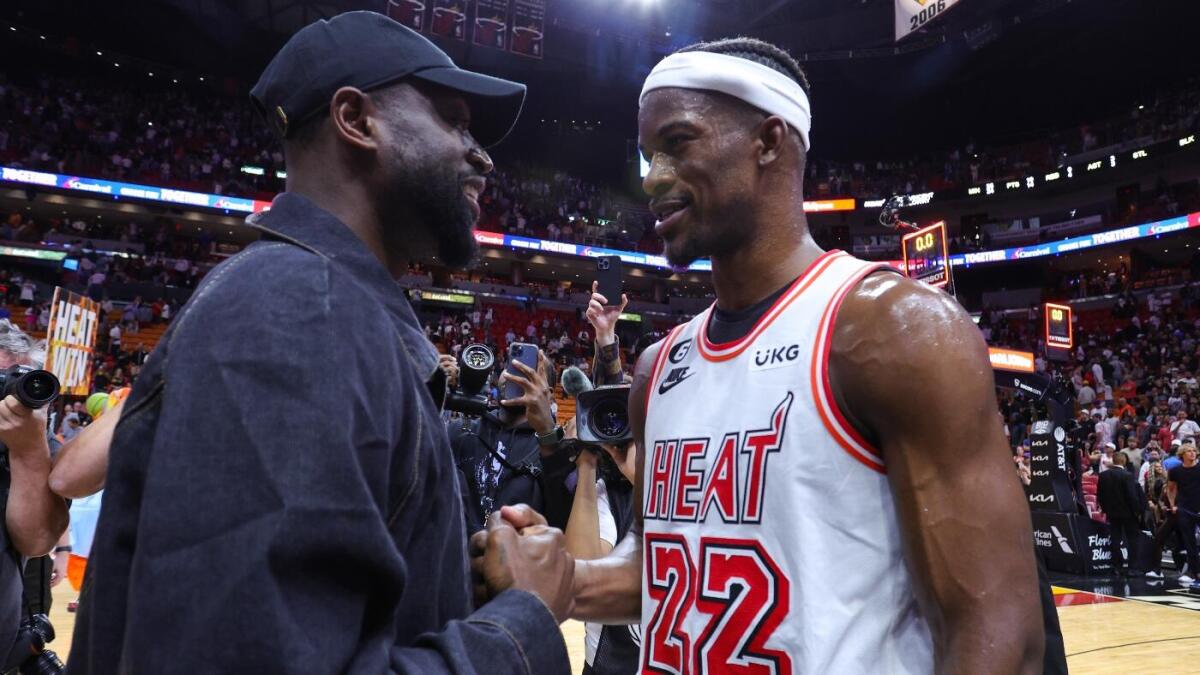The Complex Dynamics of NBA Leadership: Dwyane Wade’s Candid Critique of Jimmy Butler’s Playoff Performance
The Weight of Expectation on a Playoff Star
In the unforgiving world of NBA playoffs, every possession, shot, and decision is magnified. Jimmy Butler, celebrated for his grit and leadership, recently underwent scrutiny from none other than Dwyane Wade—a living legend and former teammate. Wade’s blunt criticism of Butler’s performance in the Golden State Warriors’ playoff series against the Minnesota Timberwolves highlights the multifaceted pressures elite athletes face. Embedded in this critique is a larger narrative about leadership, legacy, and the turbulent journey of championship aspirations.
Wade’s Critique: Spotlight on Aggressiveness and Decision-Making
At the heart of Wade’s commentary lies a striking remark: Butler “wouldn’t look at the basket.” This expression cuts deep, capturing Wade’s frustration with what he viewed as Butler’s passive approach during critical moments. The phrase symbolizes more than missed shots; it indicates hesitation, a departure from the aggressive mentality expected in high-stakes playoff basketball.
The statistic backing this observation is telling—Butler took only 11 shots in about 42 minutes during a pivotal Game 5, a surprisingly modest effort for a player often lauded as “Playoff Jimmy.” Wade’s observation isn’t merely about scoring volume but about Butler’s assertiveness when leadership and decisiveness are most needed. From Wade’s perspective, Butler’s inclination to be a “pass-first” player seemed to have undermined the team’s momentum when the external conditions demanded a shift toward self-driven scoring and control.
A Shared History: The Miami Heat Connection
Understanding Wade’s criticism requires appreciating their intertwined histories. Butler and Wade shared formative years with the Miami Heat, where Wade was both an idol and a mentor. Butler has acknowledged Wade’s influential role not just on the court but in shaping his approach to life and professionalism.
However, their relationship was not devoid of conflict. Tensions and leadership clashes occasionally surfaced, enriching the subtext behind Wade’s critique. It reveals the complexity of mentorship in the high-pressure environment of professional sports—a blend of respect, rivalry, and uncompromising expectations. Wade’s candidness reflects both a veteran’s disappointment and the weight of having seen Butler’s potential firsthand.
The Warriors’ Playoff Context: Rising Without a Star
Butler’s responsibility expanded vastly in the Warriors’ postseason. With Stephen Curry sidelined due to injury, Butler was thrust into the role of primary leader and scorer. The expectation was for him to embody the fearless, relentless competitor revered from his Heat tenure.
Yet, the series outcome and Butler’s quieter stat line suggest an unfulfilled promise. The reduced aggression and shot attempts during crucial games led to a sputtering offensive execution that ultimately contributed to the Warriors’ elimination. This shift raises significant questions about Butler’s ability to adapt and thrive outside his established roles and systems, and whether he can carry a team absent a dominant complementary star.
The Duality of “Playoff Jimmy”
Butler’s playoff reputation is marked by peaks as impressive as the valleys observed recently. The moniker “Playoff Jimmy” honors his history of clutch performances and leadership under pressure, epitomized by moments like Game 6 against the Celtics in 2022, where he elevated his team against overwhelming odds.
This duality—between past brilliance and present struggles—fuels debate. Critics point to moments of passivity and hesitation, while supporters emphasize basketball’s collective nature, rallying around injuries to star players and evolving team dynamics. Butler’s challenge is reconciling these sides and demonstrating consistency amid changing contexts and increasing expectations.
Leadership and Mentorship: Wade’s Role in the Narrative
Wade’s commentary transcends simple critique; it embodies the complex role of leadership and mentorship in professional sport. His honest assessment serves as both an admonition and an encouragement—a veteran urging a younger peer to reclaim his assertiveness and rediscover the aggressive flame that once defined him.
Their relationship underscores how mentorship extends beyond technical advice, encompassing emotional and psychological challenges athletes face in their careers. Wade’s voice injects a necessary tension between support and accountability, suggesting that true mentorship includes uncomfortable truths essential for growth.
Broader Repercussions: Legacy, Franchise, and Future Outlook
Wade’s poignant comment about Butler’s departure leaving a “stain” on the Miami Heat narrative poignantly captures the interplay between individual careers and franchise legacies. It underscores how fractures between players and teams can reverberate beyond immediate seasons, affecting reputations and organizational identities.
For Butler, the path forward likely involves redefining his role and embracing adaptability without losing his core competitive identity. For the Warriors, integrating Butler into their playoff vision absent Curry presents a testing ground for resilience and strategic adjustment. Wade’s perspective also highlights the ongoing dialogue veteran stars hold over the evolving landscape of leadership and talent management in the NBA.
Conclusion: The Pursuit of Greatness Amid Harsh Realities
The exchange between Dwyane Wade and Jimmy Butler epitomizes the relentless demands placed on basketball’s elite—where history, mentorship, and raw performance collide under a microscope of public scrutiny. Wade’s critique is a powerful reminder that great players balance individual assertiveness with team dynamics, all while managing the ever-present burden of expectation.
As Jimmy Butler navigates this crossroads, Wade’s words resonate as both a challenge and a beacon, inviting him to reclaim the fearless, commanding presence that once made him a playoff icon. Their entwined stories reflect the unyielding pursuit of greatness in a league where every moment counts and legacy is forged not only by talent but by resilience and relentless self-evaluation.











